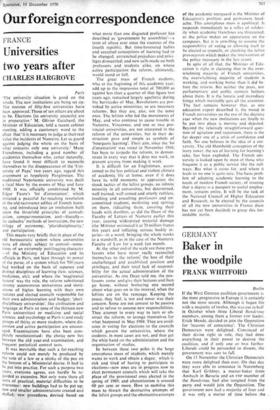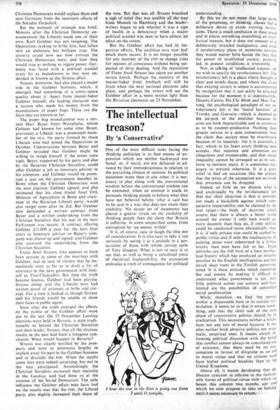GERMANY
Baker in the woodpile
FRANK WHITFORD
Berlin If the West German coalition government is the most progressive in Europe it is certainly not the most secure. Although it began life with a majority of twelve, this was cut in half in October when three Liberal Bundestag members, among them a former FOP leader, Erich Mende, decided to join the Opposition for 'reasons of conscience'. The Christian Democrats were delighted. Convinced of their divine right to rule, they had done everything in their power to destroy the coalition, and if only one or two further Liberals could be persuaded to dissent, the government was sure to fall.
On 13 November the Christian Democrats were more delighted than ever. On that day they were able to announce in Nuremberg that Karl Geldner, a master-baker from Ansbach in Bavaria and an FOP member of the Bundestag, had also resigned from the party and would join the Opposition. The government now had a majority of four and it was only a matter of time before the ,
Christian Democrats would replace them and save Germany from the imminent effects of the Socialist Ost ' But the moment of triumph was brief. Minutes after the Christian Democrat an- nouncement the Liberals made one of their own. Karl Geldner was not resigning. The Opposition, seeking to bribe him, had fallen into an elaborate but brilliant trap. The country could now see how corrupt the Christian Democrats were, and how they would stop at nothing to regain power. Ger- many was faced with a political scandal every bit as malodorous as that now en- shrined in history as the Strauss affair.
Strauss, moreover, had also played a major role in the Geldner business, which, it emerged, had something of a comic-opera quality about it. Apart from master-baker Geldner himself, the leading character was a tycoon who made his money from the manufacture of paper bags. These are the facts that are known so far.
The paper bag manufacturer was a cer- tain Herr Beyer from Westphalia, whom Geldner had known for some time. Beyer,
previously a Liberal, was a prominent mem- ber of the NLA, the party formed by those
Liberals who had joined the Opposition in October. Conversations between Beyer and Geldner revealed that Geldner might be willing to resign himself if the terms were right. Beyer, supported by his party and also by the Bavarian Christian Socialists, could offer Geldner a job as honorary advisor to his company, and Geldner would be prom- ised a seat on the government benches in Bonn when the Christian Democrats won the next election. Geldner agreed, and also intimated that his close friend Josef Ertl, Minister of Agriculture in Bonn and chair- man of the Bavarian Liberal party, would also resign soon after he did. But Geldner also demanded a written contract from Beyer and a written undertaking from the Christian Socialists that his seat in the next Parliament was secure. A contract offering Geldner £11.000 a year for the next four years as honorary advisor to Beyer's com- pany was drawn up and signed, and Geldner also received the undertaking from the Christian Socialists.
Franz Josef Strauss, who appears to have been present at some of the meetings with Geldner, was so sure of victory that he im- mediately went as far as to draft a list of ministers in the next government with him- self as Vice-Chancellor. But then the truth became known. Geldner had been playing Strauss along, and the Liberals now had written proof of attempts to bribe and cor- rupt. For a time it looked as though Strauss and his friends would be unable to show their faces in public again.
Soon after the truth emerged the effects on the public of the Geldner affair were put to the test. On 23 November Landtag elections were held in Bavaria, a state tradi- tionally so behind the Christian Socialists and their leader, Strauss, that all the election results in the past had been a foregone con- clusion. What would happen in Bavaria?
Strauss was clearly terrified by the pros- pects and went to enormous lengths to explain away his part in the Geldner business
and to discredit the FDP. When the results
came they were indeed surprising, but not in the way anticipated. Astonishingly the
Christian Socialists increased their majority in the Landtag, and had done so at the expense of the Social Democrats. The only influence the Geldner affair may have had on the results was that the FOP, the Liberal party, also slightly increased their share of
the vote. But that was all. Strauss breathed a sigh of relief that was audible all the way from Munich to Hamburg and the leader- writers began to ask whether it was a sign of health in a democracy when a major political scandal was seen to have almost no effect on the voters.
But the Geldner affair has had its portant effects. The coalition may now feel much more secure. It is no longer possible for any member of the FOP to change sides for reasons of conscience without being sus- pected of dirty dealing. And the reputation of Franz Josef Strauss has taken yet another severe knock. Perhaps the memory of the master-baker from Ansbach will still be fresh when the next national elections take place, and perhaps the voters will see the Geldner affair in a more serious light than the Bavarian electorate on 23 November.







































 Previous page
Previous page